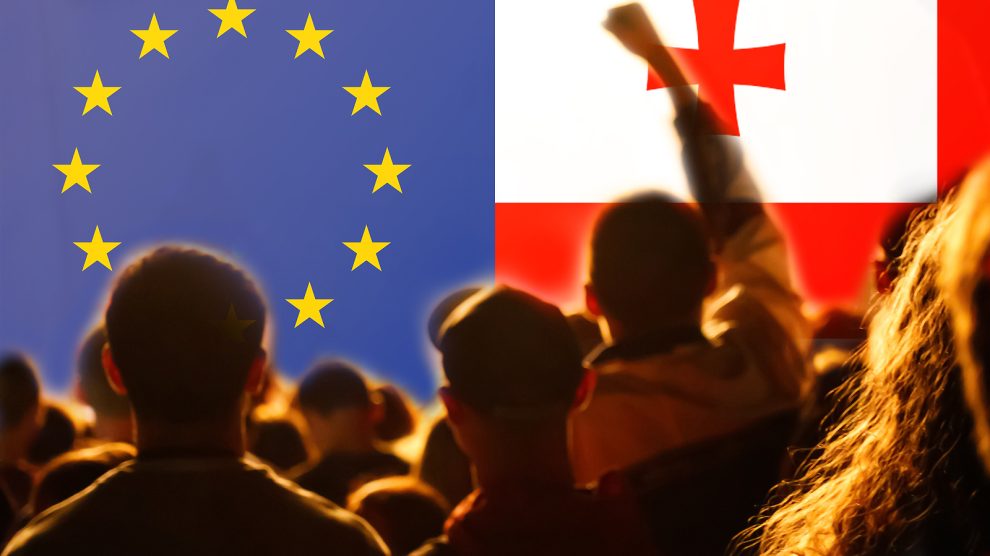Despite political challenges and polarisation, the unwavering enthusiasm of Georgians, who consistently demonstrate strong support for EU membership, remains a driving force on the nation’s unbreakable path towards European integration.
Many Georgian and EU politicians and experts are actively discussing the perceived shift in Georgia’s stance towards the West and its potential regression in EU integration.
These fears and opinions have intensified since June 2022 when Georgia was granted a European Perspective but not EU membership candidate status. This development has sparked questions about the country’s commitment to its Euro-Atlantic journey.
- Economy in Focus: Georgia
- For how long can Georgia continue playing both sides?
- An alternative to Russia and China: Turkey’s role in the South Caucasus and Central Asia
However, it is essential to consider the unwavering enthusiasm of Georgian citizens, as reflected in monthly polls conducted by the National Democratic Institute (NDI), where support for EU membership consistently remains at an impressive 85-90 per cent.
In Georgia’s political landscape, governments may come and go, but the people remain steadfast in their pro-EU sentiments. The foundation of Georgia’s continued commitment to the Euro-Atlantic path lies within the populace.
Their deep-rooted desire to be part of the European family has served as a driving force in the country’s journey so far. Even the late Georgian President Eduard Shevardnadze, who had once served as a Foreign Minister of the Soviet Union, officially requested NATO membership, showcasing a historical willingness to align with Western institutions.
The current political climate
Nonetheless, the current political climate in Georgia presents some challenges to its EU aspirations.
Recent actions by the government of Georgia, such as the foreign agents law and the harsh statements made by Georgian MPs against EU parliament members and institutions, have raised concerns about the country’s commitment to EU membership reforms.
These moves are perceived as being at odds with the EU integration agenda, leading to doubts and uncertainty about the future direction of the country.
Addressing these concerns requires open and transparent political discussions and debates. However, the political arena in Georgia is deeply polarised, with high-ranking officials from both the ruling party and the opposition often avoiding talk shows on critical TV channels. This lack of engagement only fuels hopelessness and nihilism among the Georgian population regarding their country’s future.

A fresh start
To gain EU candidate country status, one of the twelve necessary recommendations is to end this polarisation, emphasizing the crucial role of political figures in achieving this goal.
Finding common ground among the political parties would allow Georgia to present a united front towards EU integration. The upcoming 2024 elections could serve as a pivotal moment for building a coalition that can reduce the current level of polarisation and foster an environment of cooperation and compromise.
This fresh start would be particularly beneficial for the ruling party, which was elected on a pro-EU agenda in 2020, and whose supporters eagerly anticipate tangible results on the EU integration path.
Despite the challenges posed by polarisation, the underlying optimism and determination of Georgian citizens cannot be underestimated. Their consistent EU enthusiasm over the last three decades is a testament to their commitment to the European dream. The unwavering belief in the benefits of EU membership has kept Georgia firmly on the track towards EU and NATO integration.
In conclusion, Georgia’s path towards the EU remains unbreakable as long as the citizens maintain their enthusiasm and aspiration for European integration. While political challenges and polarisation exist, the power to overcome these obstacles lies within the hands of the Georgian people and their representatives.
By fostering an environment of open dialogue and cooperation, Georgia can demonstrate its unwavering commitment to becoming a part of the European family.
As governments come and go, it is the enduring will of the people that will ultimately shape Georgia’s destiny on its Euro-Atlantic journey.
Unlike many news and information platforms, Emerging Europe is free to read, and always will be. There is no paywall here. We are independent, not affiliated with nor representing any political party or business organisation. We want the very best for emerging Europe, nothing more, nothing less. Your support will help us continue to spread the word about this amazing region.
You can contribute here. Thank you.


